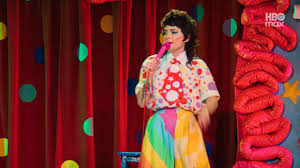The Pod Generation 2023 Movie Review
The Pod Generation is a clever and creative cautionary tale about the direction society is moving in, and it wisely questions whether that direction is for the greater good of humanity. This movie is science fiction at its best. It explores the dangers of automation and artificial intelligence, and does so in exciting new ways. Like other great sci-fi films, it asks many questions of its characters and its audience. Does an increasingly automated society begin to make life itself redundant? This is a question seemingly at the center of this story. In our own world, and in the world of this film, machines are taking over tasks previously completed by humans. While this can start as convenience, this film poses the possibility our reliance on technology could move so far in one direction we forget what it means to be a human being. The dystopian society on display in this movie is subtle, and just a notch beyond what’s already happening in our own world.
In making one of the main characters a botanist, the film quietly raises its voice about the importance of nature to our individual selves and the communities we live in. Chiwetel Ejiofor’s character Alvy is a professor, and he reflects on his students and their inability to connect with nature. We see this in our own society. As technology becomes more ingrained in our own lives, we can see the move away from nature that’s occurring in the real world. At one point Alvy says “we’re divorced from ourselves and emotionally starved.” Even though the technology around us provides convenience, it also pushes us away from our natural state of being.
The satire at play in this movie is excellent. Most of the humor comes from the process involved with The Womb Center, and the ridiculous (but believable) actions that take place. During one particularly funny scene, someone from the company explains how they will make sure the baby isn’t “bored” in the womb. They have supplied an array of music and podcasts for the baby to listen to while in the womb. They’re all easily accessible because the pod is often plugged in, as one would with their cell phone to keep it charged. Another fantastic scene is when the couple is watching the moment of fertilization, as the sperm meets the egg. They’re viewing the event on a gigantic screen, like one would a sports event or movie. Best of all, an employee from The Womb Center is providing live play-by-play, over-explaining every aspect of what’s happening.
Screens play a pivotal role in this film. Emilia Clarke’s character Rachel is almost constantly staring at a screen during her daily activities. Sadly, this is something frighteningly true for many people in our society. Most jobs these days consist of staring at a computer monitor for hours on end, and when people aren’t working, their attention moves to their cell phones. Thus the screen-staring continues throughout the day. It’s only the size of the screen that changes. For this reason, it often feels like we’re living in a virtual reality; the real world filtered through a fabricated existence devoid of direct interaction.
All this said, technology can and does provide great convenience to humanity. It also connects people in ways otherwise impossible. This film isn’t anti-technology. It’s merely questioning if we’re headed in the right direction, and proposes the possibility we have and may continue to take things too far. In the society depicted in this movie, artificial intelligence is responsible for making toast, tracking productivity, and measuring people’s “bliss index.” The need for convenience is shown to its extreme limit, with technology proving to be an intrusion on our lives we have welcomed into our homes.
Dreams are another important element in this movie. Rachel’s therapist, an artificial intelligence robot shaped like an enormous eye, tells her “we no longer look at dreams and try to assign them meaning.” This comes after Rachel’s concern she’s no longer having dreams. Her loss of the ability to dream seems to represent the gradual society shift of a technologically-advanced society. At another point in the movie, someone from The Womb Center mentions “dreams do not serve any evolutionary purpose.” In this story, humans have evolved “beyond” dreaming, and something about that is particularly depressing for the future of our species.
The Pod Generation, with its humorous and philosophical exploration of the crossroads between technology, nature, and society, is an excellent entry in the pantheon of science fiction cinema. It features fantastic, emotive central performances from Clarke and Ejiofor, and a sentimentally whimsical score from Sacha and Evgueni Galperine. Its tongue-in-cheek exploration of anxieties about emerging technologies is entertaining and sobering. Like all great science fiction stories, this film predicts the future based on the current state of the world. Some of these predictions are creepy, but scarily realistic. The film ends though with a sense of hope; that despite our gradual move away from the natural world, our human nature is just too too important to give up on.




